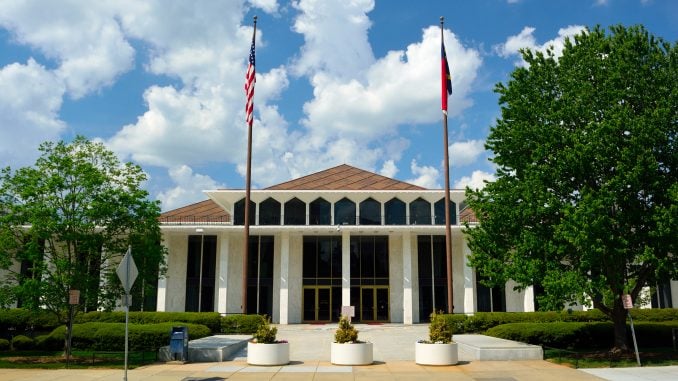
RALEIGH — Continuing the session started last week, the North Carolina legislature is considering major changes to elections laws. One bill, proposed by House Rules Chairman David Lewis, will offer an alternative to resolve a longstanding legal battle with Democratic Gov. Roy Cooper over the state elections board. Another, that was passed by the Senate Tuesday, will create rules for how the voter ID constitutional amendment, recently passed by voters, will be implemented.
A House bill filed late Monday would separate duties of the elections panel between a five-member board administering state elections and an eight-member board handling lobbying, ethics and campaign finance matters. Lewis (R-Harnett) told the North State Journal that it was necessary in light of recent accusations of blatant partisanship by the board chairman, referring to Andy Penry’s resignation after partisan social media postings.
“I believe in fair, independent and impartial Elections Board and Ethics Board,” said Lewis. “Due to the governor’s previous hand-picked Elections Board chairman’s conduct while serving, I believe that we must strive to eliminate partisanship on the board and ensure impartiality where possible.”
The governor’s party likely would hold three of the five positions on the proposed elections board. No party could hold more than half the seats on the lobbying, ethics and campaign finance board.
Judges in October struck down the latest version of a nine-member combined elections panel, saying the governor lacked the control warranted to him over an executive agency.
The bill also would repeal a commission that describes proposed constitutional amendments in writing.
In addition to this bill, H.B. 1117, the legislature is also considering a bill to fill in the rules around the newly approved voter ID law. The Senate introduced this bill, S.B. 824, last week and then passed it on Tuesday with a 32-11 vote on second reading. Three Democrats, Sens. Ben Clark, Don Davis and Joel Ford, voted with the majority.
The House received the bill and quickly assigned it to the House Elections and Ethics Law Committee, where it was amended and debated. In spite of adoption of amendments from both parties, there were some tense moments, especially around accusations of voter suppression.
Rep. Mickey Michaux (D-Durham) said during the committee that, “The reason you are passing this bill is simply for voter suppression. There’s no doubt about it.” Michaux then mentioned the Three-Fifths Compromise and literacy testing as legal provisions that were illegitimate and were struck down like he believed this bill would be.
Multiple Republicans got up after Michaux to challenge his characterization of the bill. Rep. Michael Speciale (R-Craven) said, “I take offense when race is brought up and suppression is brought up, because that is the refuge of scoundrels when they have no debate.” Rep. Jimmy Dixon (R-Duplin) assured his constituents that voter suppression had “zero effect” on his vote.
Rep. John Blust (R-Guilford) said he would be voting for the bill, but he agreed with a citizen during the public comments that it had been watered down and that the college ID portion was a weakness. Under the bill as amended, IDs from private colleges and UNC system schools would be accepted. Blust said students should just say, “Hey, Siri. Where is the board of elections?” and then get one of the “free IDs” the state is offering.
After passing from the House Elections and Ethics Law Committee, the bill will likely be heard on the House floor at their 11 a.m. session on Wednesday.


